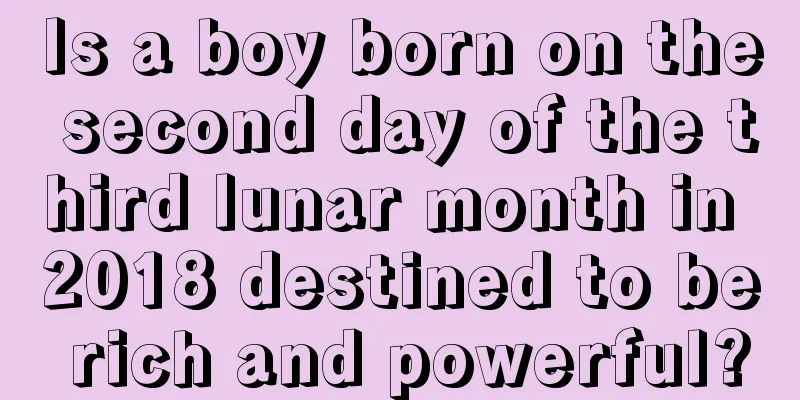The meaning of the Dragon Raising its Head on February 2

There is a folk saying that "On the second day of the second month, the dragon raises its head", which means that spring is coming, all things revive, and hibernating dragons begin to move, indicating that a year's farming activities are about to begin. In the north, "February 2" is also called the Dragon Raising its Head Day, also known as the Spring Dragon Festival; in the south it is called the Outing Festival. The custom of "February 2" has existed among the people for a long time. #For more details about the 2018 lunar calendar for February, please visit the Fortune Teller website for consultation!The many names of "February 2""February 2" is the Dragon Head Festival, also known as the Blue Dragon Festival. According to legend, the second day of the second month is the day when Emperor Huangdi was born. The Dragon Head Festival originated in the era of Fuxi, who "emphasized agriculture and farming". Every year on the second day of February, "the empress would send food and the emperor would personally plow the fields." Legend has it that the dragon can control the clouds and rain, eliminate disasters and bring blessings, and is a symbol of auspiciousness. Therefore, people use various dragon-related folk activities to pray for peace and a good harvest, which later became a custom throughout the country.During the reign of King Wu of Zhou, a grand ceremony was held on the second day of the second month every year, calling on all civil and military officials to farm the land themselves. "February 2" is said to be the "Flower Festival" in the Song Dynasty, and this day was designated as the birthday of all flowers. In the Yuan Dynasty, it was called "Tasting Festival", and people went out for outings and picnics on this day. Some people pick some pampas leaves (a kind of flower leaves growing on the ground) along the way and take them home to worship in front of the door when they go home from an outing. This custom means "welcoming wealth". During the Ming and Qing dynasties, this day was called the "Dragon Raising its Head" day because the second day of the second month of the lunar calendar falls around the "Qingzhe" solar term. People hope that the dragon can suppress all harmful poisonous insects and hope for a good harvest. This is the origin of the saying "On the second day of the second month, the dragon raises its head." Astronomical explanation of “February 2, the Dragon Raises its Head”The Chinese people believe that the dragon is a symbol of good luck and is in charge of clouds and rain, and the second day of the second month in the lunar calendar is the day when the dragon ascends to heaven. In terms of solar terms, the beginning of February in the lunar calendar is between "Rain Water", "Qingzhe" and "Spring Equinox", and many places begin to enter the rainy season. This is the law of nature, but the ancients believed that it was the work of the "dragon". Moreover, the dragon has a very high status in the minds of the Chinese people. It is not only a symbol of good fortune, but also the master of weather and rain.“February 2, the dragon raises its head” also has an ancient astronomical explanation, but it is often overlooked. In ancient China, the Twenty-Eight Mansions were used to indicate the positions of the sun, moon and stars in the sky and to determine the seasons. Among the twenty-eight constellations, seven of them, namely Jiao, Kang, Di, Fang, Xin, Wei and Ji, form a complete dragon-shaped constellation, among which Jiao is like a dragon's horn. Every February after the spring breeze, the "Dragon Horn Stars (i.e. Spica I and Spica II)" appear from the eastern horizon at dusk. At this time, the whole body of the Canglong is still hidden below the horizon, only the Spica is just beginning to appear, so it is called "the dragon raising its head". As the "dragon raises its head", spring slowly comes to the world. The earth is turning green again, and spring ploughing has begun from south to north. Folk customs of February 2There are many folk customs on the day of "February 2". Although some of these customs have disappeared today, in ancient my country, the meaning of "February 2" was significant and cannot be ignored. On this day, people burn incense and offer sacrifices to the Dragon God in order to pray for rain, the elimination of pests, and a good harvest. They also carry out some dragon-related activities.Knocking the Dragon's Head Knocking the dragon's head is to wake the dragon up. In the Northeast region, on the morning of "February 2", people hit the beams of the house with a long pole, which is called "knocking the dragon's head". Wake up the dragon and bring peace to the area. Adults and children also recite: "On the second day of the second month, the dragon raises its head, the big granaries are full and the small granaries flow." In some places, people use stove ash to spread big circles in the yard and put grains in the middle, which is called "da granary" or "filling granary", wishing for a good harvest and full granaries that year. The second day of the second month in the lunar calendar is the day when the hibernating dragon ascends to heaven. People believe that shaving one’s head on this day will bring good luck and fortune. Cutting children's hair is called "shaving a happy head". It takes advantage of the auspicious time when the dragon raises its head to bless the children to grow up healthily and become successful when they grow up. For adults, getting a haircut means bidding farewell to the old and welcoming the new, hoping to bring good omens and good luck. Therefore, the folk proverb says, "If you shave the dragon's head on the second day of the second month, you will have a good spirit throughout the year." There are certain dietary requirements on the day of eating dragon food . Because people believe in the "power of dragons", most of the food on this day is named after dragons. Eating spring pancakes is called "eating dragon scales", eating noodles is called "eating dragon whiskers", eating wontons is called "eating dragon eyes", eating dumplings is called "eating dragon ears", cooking noodles and wontons together is called "dragon pearls", and eating scallion pancakes is called "tearing dragon skin". Everything is based on symbols and meanings related to the dragon. These all reflect people's strong desire to pray for the dragon's blessing. Take "Grandma" Another important activity on the day of "February 2" is to welcome the "aunt", that is, the bride's family takes back the married daughter, so there is a saying "February 2, pick up the baby". Because the old Beijing people have many etiquettes, one of which is that the "aunt" cannot live in her parents' home during the first month of the lunar year. After visiting her parents' home to pay New Year's greetings on the second day of the lunar year, she must return to her husband's home on the same day, especially for newly married "aunts". But on the second day of the second month, her parents would come to pick her up and ask her to stay for a few days or half a month. One reason was that she had been busy for a long time in the first month of the year and was quite tired, so they wanted to take her back to her parents' home to have a good rest; the other reason was that the new year had just begun and they would be busy again, so they wanted to reward her. Spring pancakes, which are thin pancakes, are usually served as a treat. During the days after being brought back, "Grandma" spent her time eating and drinking, visiting neighbors and chatting, and her life was relaxed and happy. Respecting the Land The ancients believed that the earth gave birth to all things, so the land god was one of the most widely worshipped gods. People believed that the god was in charge of the growth of grains and local peace. According to legend, "February 2" is the birthday of the God of Land, and people in many places offer sacrifices to the God of Land on this day. In Funing, Jiangsu Province, when farmers worship the land, each family takes some ashes from the stove and scatters them into a big circle in the yard or in front of or behind the house, and burns paper and incense, praying to the land god to bless the crops to grow vigorously and avoid disasters such as wind, hail, borers and locusts. Fumigating Insects The term "fumigating insects" was first seen in Volume 2 of "A Brief Description of Scenery in the Capital" written by Liu Dong of the Ming Dynasty: "On the second day of the second month, the dragon raises its head. People steam New Year's Day cakes for worship, and fumigate beds and kangs. This is called 'fumigating insects.' It is said to attract the dragon so that the insects will not come out." There are similar records in many local chronicles. On this day, people fry the cakes used for Spring Festival sacrifices or new pies and eat them in the hope of attracting the dragon back, thereby deterring the restless insects. They also use the smoke from the fried cakes to fumigate their beds and kangs. The idea is to use this to suffocate the insects that are about to revive, drive away disasters and maintain health. Biting insects Biting insects is also called "eating fried beans". There are two types of fried beans: sweet and salty. It is said that eating fried beans means eating pests, which can protect people, animals and crops from being invaded by pests. Frying beans on the second day of the second month is called "killing insects", and sprinkling ashes around the house is called "banning insects". In addition, in Shandong and other areas of my country, during the Spring Dragon Festival, people use stove smoke to draw a dragon on the ground, commonly known as the money-attracting dragon. This has two purposes: one is to invite the dragon back to make clouds and rain, and pray for a good harvest; the other is that the dragon is the god of all insects, and when the dragon comes, all insects hide, which is beneficial to human health and crop growth. People in Nantong, Jiangsu Province make longevity peaches and livestock with flour, steam them, and insert them on bamboo sticks, which they then put in the fields at night. They believe that these are foods for offering to the god of insects and worshiping their ancestors. They pray to their ancestors to drive away insect plagues and also hope that the god of insects will not harm the crops. "February 2" in folk proverbsOn the second day of the second lunar month, the dragon raises its head, and people of all kinds use oxen to plow."February 2" is also an agricultural festival in rural areas. An agricultural proverb says: "On the second day of the second month, the dragon raises its head, and households of all kinds use oxen to plow the fields." However, in some places, spring droughts are more severe and spring rain is as precious as oil. If there is abundant spring rain, it indicates a good harvest in the year. Hence, there is a farmer's proverb: "On the second day of the second month, the dragon raises its head, and the big warehouses are full and the small warehouses are flowing." On the second day of the second month, shine the light on the beams of the house so that scorpions and centipedes have nowhere to hide . There is a folk saying in Beijing that goes, "On the second day of the second month, shine the light on the beams of the house so that scorpions and centipedes have nowhere to hide." People have to get rid of pests on this day. They light candles and shine the light on the beams and walls to get rid of scorpions, centipedes, etc. When these insects see the light, they fall down and are killed. The custom of expelling insects on this day is mainly popular in northern China. "February 2" is around the time of Jingzhe in the twenty-four solar terms. At this time, various insects including poisonous insects begin to become active. In order to avoid harm from poisonous insects, people hold some activities that contain the meaning of expelling insects. For example, you can use sticks, brooms or shoes to knock on beams, walls, doors, beds, etc. to avoid snakes, scorpions, centipedes, rats, etc. Usually people also chant ballads, such as "On the second day of the second month, the dragon raises its head, scorpions and centipedes don't show their heads" and "On the second day of the second month, knock the gourd and fork, and nine out of ten nests of mice will go blind." The dragon raises its head, if the dragon doesn't raise its head, I will raise my head "February 2" is also a day to look forward to academic success. In the past, private school teachers often accepted students on this day, which was called "taking the lead." Students would also chant: "On the second day of the second month, the dragon raises its head. If the dragon doesn't raise its head, I will raise my head." I can't pick up my baby, and I'm crying "February 2" is also the day when a daughter-in-law returns to her parents' home. According to old customs, a daughter-in-law has to live with her husband's family during the first month of the lunar year and is only allowed to return to her parents' home after the first month. Therefore, there is a folk song in China that goes "On the second day of the second month, go to pick up your baby. If you can't, you'll cry," which expresses the parents' desire for their daughter to return. There are many folk proverbs about "February 2": like "February 2, fry rice cakes, use a thinner fire and cook slowly." There is also "On the second day of the second month, the dragon raises its head, the emperor plows the land, his ministers drive the oxen, the empress comes to deliver food, the ministers of the court throw away the seeds, he leads the world in spring plowing and summer weeding, and there is a bumper harvest and a peaceful autumn." |
<<: Are there any customs for the Spring Equinox? When is the Spring Equinox in 2018?
Recommend
Query of the position of the God of Happiness on the 12th day of the 10th lunar month in 2018
Want to know more about the days in the tenth mon...
The most recent taboos of the Ghost Festival in July, 24 taboos you must know about the Ghost Festival
The Zhongyuan Festival originated from the ancesto...
Is the Double Ninth Festival in September 2020 not suitable for engagement? What do people usually do on the Double Ninth Festival?
Introduction: It is necessary to choose an auspici...
Is the eighth day of the eleventh lunar month in 2019 a suitable day to pick up a new car?
Is the eighth day of the eleventh lunar month in ...
Is it possible to move house on February 28th of the lunar calendar in 2018?
Spring is a great time full of energy, with every...
How is the fourth day of the ninth lunar month in 2021? What zodiac sign is this day?
The ninth month of the lunar calendar is the third...
Is the fate of a girl born on September 20th of the lunar calendar in 2019 good or bad?
Is the fate of a girl born on September 20th of th...
What is the date of the Dragon Boat Festival in 2020? What is the date of the lunar calendar? Is it a good idea to get engaged on the Dragon Boat Festival in 2020?
Introduction: The specific time when the Dragon Bo...
Where is the God of Wealth on July 22, 2018?
The seventh month of the lunar calendar is the ti...
What is the zodiac sign of a baby born on Cold Food Festival in 2020 and what are their characteristics?
Everyone has his or her own zodiac attribute, whic...
Is it a bad idea to get a haircut on the twelfth day of the sixth lunar month in 2018?
Introduction: June represents heat, and going out ...
Where is the direction of the God of Happiness on May 13, 2017, and what is the God of Happiness?
The Dragon Boat Festival month is the fifth month...
Is the Ghost Festival on July 15, 2021 an auspicious day? Is this day suitable for starting renovations?
As the saying goes, the hottest month of July is s...
Is it good for a girl born on May 14th of the lunar calendar in 2020? How is her overall fortune?
Introduction: Although everyone cannot choose the ...
What time is Grain in Ear in 2022? Famous poems about Grain in Ear
The specific dates of the 24 festivals each year a...









